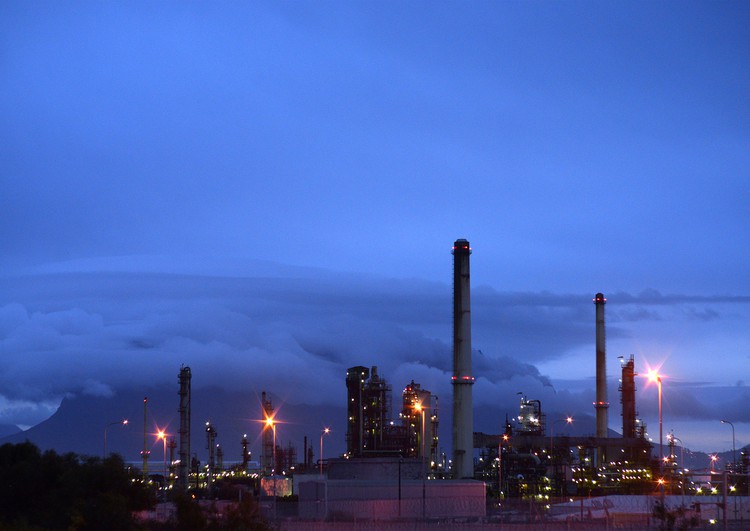Green Scorpions order City of Cape Town to sort out pollution in the Milnerton Lagoon
Refinery which usually uses effluent from the Potsdam treatment plant switched to drinking water because the effluent is too dirty
The fuel refinery in Milnerton has had to use municipal water in the process of distilling fuel because the quality of effluent from the Potsdam Waste Water Treatment Works has been too poor to use. Failures at the Potsdam plant have also caused severe pollution in the Milnerton Lagoon. Photo: Steve Kretzmann
- The Green Scorpions have ordered the City of Cape Town to sort out the pollution of Milnerton Lagoon.
- This follows two earlier warnings.
- The City has appealed against the order.
- The pollution is due to failures at the Potsdam treatment plant.
- The refinery, which usually uses effluent from the plant, has resorted to using drinking water as the effluent is too dirty.
The Green Scorpions have ordered the City of Cape Town to sort out pollution in the Milnerton Lagoon, following continued failures at the Potsdam Waste Water Treatment Works.
The problems at the Potsdam plant in Milnerton have also led to the loss of drinking water, as the Milnerton fuel refinery, which would normally use treated effluent, has switched to municipal water because the effluent is too dirty.
The treated effluent from the Potsdam plant is used notably by Astron Energy, which operates the fuel refinery, as well as for irrigation by farmers, Century City, and MyCiTi. It also flows into the Diep River, which becomes the Milnerton Lagoon before flowing out to sea.
The Green Scorpions issued a directive to the City of Cape Town on 21 September, ordering it to remedy the state of the lagoon, which is filled with stagnant, polluted effluent. Failure to comply is a criminal offence.
The directive follows warnings in February and March. Civic bodies such as the Milnerton Central Residents Association have long complained about the state of the water in the estuary, which often smelt of sewage, and the Organisation Undoing Tax Abuse (OUTA) has taken up the cause.
City Mayco Member for Water and Waste Xanthea Limberg confirmed receipt of the Green Scorpions’ directive issued on 21 September. She said an appeal against the directive had been lodged and the City would “continue to implement its action plan to improve water quality in the Diep River and Milnerton Lagoon”.
At a press conference in February, seven days after the Green Scorpions’ initial letter, incoming City director of water and sanitation, Michael Webster, said R11 billion had been committed over ten years to upgrade the waste water treatment works, but the City recognised “there should have been investments earlier in regard to Diep River”.
The Potsdam disinfection system was in urgent need of repair, a “belt press” was needed to remove solids from the water, and retention ponds needed repair, said Webster.
Limberg said Potsdam was now compliant with Department of Water and Sanitation licence conditions and “there has been immense progress following various interventions to improve the final effluent quality”. A R1.75 billion upgrade of the plant was currently underway, she said.
But the head of the Milnerton Central Residents Association environmental portfolio, Caroline Marx, said while the effluent released at Potsdam may now meet the necessary standards, independent water testing had revealed that e.coli counts below the outlet were far higher than those upstream.
Marx said it may be that the retention ponds, which Webster admitted were leaking, were still releasing untreated or partially treated sewage back into the river.
The City lodged its appeal on 20 October, said James-Brent Styan, spokesperson for Department of Environmental Affairs and Development Planning MEC Anton Bredell, who will have to decide on the merits of the City’s appeal. He said Bredell would try to consider it within 60 days.
Sewage plant failure costs drinking water
Failures at Potsdam have caused precious drinking water to be lost to industrial purposes.
Industry water usage figures for 2015 to 2019, obtained following a successful Promotion of Access to Information Act (PAIA) application earlier this year, showed that Astron Energy’s municipal water use tripled from about 500 million litres in 2018, to 1.5 billion litres in 2019.
Astron Energy spokesperson Suzanne Pullinger said the fuel refinery usually obtained much of the water needed for its industrial processes from the Potsdam plant.
Pullinger said the refinery can use up to 5.9 million litres of water per day when running at full capacity. This water is mostly for cooling distilled crude oil, and for steam generation to drive pumps and compressors.
But, she said, in 2019 the effluent from Potsdam was so polluted the refinery couldn’t use it.
“There have been effluent water quality issues with the Potsdam supply which has meant switching to municipal water usage,” said Pullinger.
Limberg said other than Astron, water from Potsdam was used by Sappi, Durbanville farmers, Century City and MyCiTi.
Support independent journalism
Donate using Payfast

Don't miss out on the latest news
We respect your privacy, and promise we won't spam you.
Next: Mom carries disabled child up six flights of stairs at Addington Hospital
Previous: Immigrant shop-owners in Durban fear for their lives after attacks
© 2020 GroundUp. This article is licensed under a Creative Commons Attribution-NoDerivatives 4.0 International License.
You may republish this article, so long as you credit the authors and GroundUp, and do not change the text. Please include a link back to the original article.

